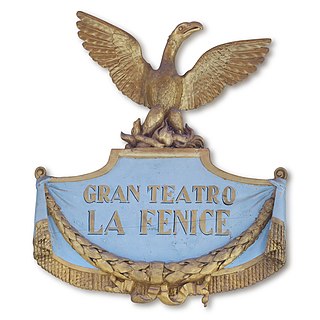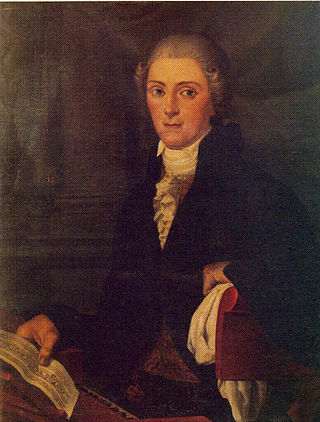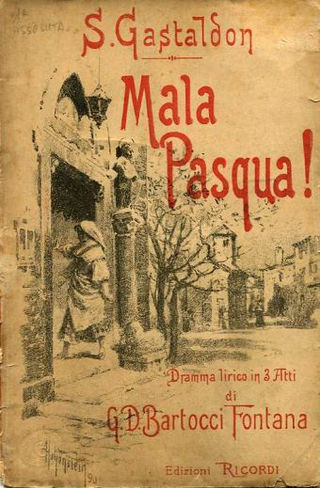A castrato is a type of classical male singing voice equivalent to that of a soprano, mezzo-soprano, or contralto. The voice is produced by castration of the singer before puberty, or it occurs in one who, due to an endocrinological condition, never reaches sexual maturity.

Giovanni Paisiello was an Italian composer of the Classical era, and was the most popular opera composer of the late 1700s. His operatic style influenced Mozart and Rossini.

Alceste, Wq. 37, is an opera by Christoph Willibald Gluck from 1767. The libretto was written by Ranieri de' Calzabigi and based on the play Alcestis by Euripides. The premiere took place on 26 December 1767 at the Burgtheater in Vienna.

Teatro La Fenice is an opera house in Venice, Italy. It is one of "the most famous and renowned landmarks in the history of Italian theatre" and in the history of opera as a whole. Especially in the 19th century, La Fenice became the site of many famous operatic premieres at which the works of several of the four major bel canto era composers – Rossini, Bellini, Donizetti, Verdi – were performed.

L'Olimpiade is an opera libretto in three acts by Metastasio originally written for an operatic setting by Antonio Caldara of 1733. Metastasio’s plot vaguely draws upon the narrative of "The Trial of the Suitors" provided from Book 6 of The Histories of Herodotus, which had previously been the base for Apostolo Zeno's libretto Gli inganni felici (1695). The story, set in Ancient Greece at the time of the Olympic Games, is about amorous rivalry and characters' taking places to gain the loved one. The story ends with the announcement of two marriages.

Il crociato in Egitto is an opera in two acts by Giacomo Meyerbeer, with a libretto by Gaetano Rossi. It was first performed at La Fenice theatre, Venice on 7 March 1824. The part of Armando was sung by the famous castrato, Giovanni Battista Velluti; the opera was probably the last written to feature a castrato. It is the last of Meyerbeer's series of operas in Italian, and became the foundation of the composer's international success.
Ranieri de' Calzabigi was an Italian poet and librettist, most famous for his collaboration with the composer Christoph Willibald Gluck on his "reform" operas.
Giuseppe Farinelli was an Italian composer active at the end of the 18th century and the beginning of the 19th century who excelled in writing opera buffas. Considered the successor and most successful imitator of Domenico Cimarosa, the greatest of his roughly 60 operas include I riti d'Efeso, La contadina bizzarra and Ginevra degli Almieri. More than 2/3 of his operas were produced between 1800-1810 at the height of his popularity. With the arrival of Gioachino Rossini his operas became less desirable with the public, and by 1817 his operas were no longer performed. His other compositions include 3 piano forte sonatas, 3 oratorios, 11 cantatas, 5 masses, 2 Te Deums, a Stabat mater, a Salve regina, a Tantum ergo, numerous motets, and several other sacred works.

Gaspare Pacchierotti was a mezzo-soprano castrato, and one of the most famous singers of his time.
Giovanni Bertati was an Italian librettist.

Giacomo David, was a leading Italian tenor of the late 18th and early 19th centuries.

Brigida Banti, best known by her husband's surname and her stage-name, as Brigida Banti, was an Italian soprano.
Giovanni Tadolini was an Italian composer, conductor and singing instructor, who enjoyed a career that alternated between Bologna and Paris. Tadolini is probably best known for completing six sections of Rossini's 1833 version of the Stabat mater after the latter fell sick. However, he also composed eight operas as well as sinfonias, sonatas, chamber music, and numerous pieces of religious music and art songs.

The Teatro San Benedetto was a theatre in Venice, particularly prominent in the operatic life of the city in the 18th and early 19th centuries. It saw the premieres of over 140 operas, including Rossini's L'italiana in Algeri, and was the theatre of choice for the presentation of opera seria until La Fenice was built in 1792.
La Passione di Gesù Cristo is the title of a libretto by Metastasio which was repeatedly set as an azione sacra or oratorio by many composers of the late baroque, Rococo and early classical period.

Mala Pasqua! is an opera in three acts composed by Stanislao Gastaldon to a libretto by Giovanni Domenico Bartocci-Fontana. The libretto is based on Giovanni Verga's play, Cavalleria rusticana which Verga had adapted from his short story of the same name. Mala Pasqua! premiered on 9 April 1890 at the Teatro Costanzi in Rome, six weeks before Pietro Mascagni's opera Cavalleria rusticana which was also based on Verga's play. Bartocci-Fontana's libretto adds some elements that were not in Verga's original and expands on others. The name of the Santuzza character was also changed to Carmela, but the basic plot and setting remain the same. Its title refers to the curse which Carmela places on Turiddu, the lover who had spurned her: "Mala Pasqua a te!". Following its Rome premiere, Mala Pasqua! had a few more performances in Perugia and Lisbon, but it was completely eclipsed by the phenomenal success of Mascagni's opera. After the 1891 Lisbon run it was not heard again until 2010 when it was given a semi-staged performance in Agrigento, Sicily.
Giovanni Ansani was an Italian tenor and composer.
Alessandro Pepoli (1757–1796), was an Italian librettist and author of tragedies.
Telemaco nell'isola di Calipso is dramma per musica opera by Mayr to a libretto by Antonio Simone Sograffi, composed for the Venice Carnival, 1797. The cast featured the castrato Girolamo Crescentini.









